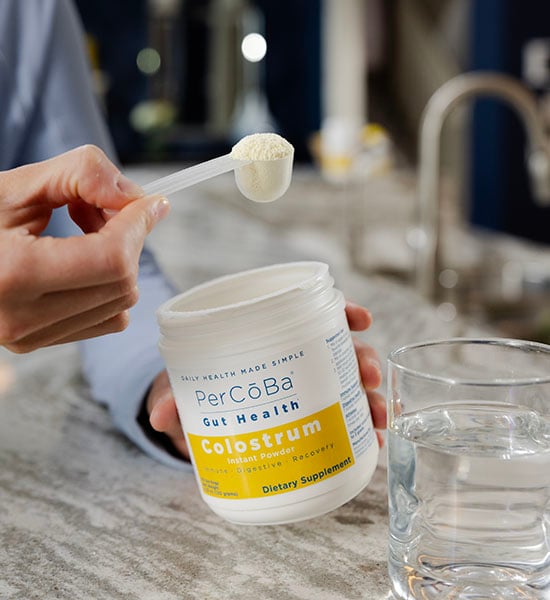Cow colostrum—also known as bovine colostrum—has become increasingly popular in the wellness space, with claims that it boosts immunity, supports gut health, enhances recovery, and promotes overall vitality. But before adding any supplement to your daily routine, it’s natural to ask an important question: Is cow colostrum safe?
In this post, we’ll explore the safety profile, potential side effects, proper dosage, and who should avoid taking cow colostrum. Whether you’re a seasoned supplement user or brand new to colostrum, this guide will help you make an informed, confident decision—grounded in science and practical recommendations.
What Is Cow Colostrum?
Cow colostrum is the first milk produced by cows in the 24 to 72 hours after giving birth. This nutrient-rich fluid is packed with immunoglobulins, growth factors, enzymes, proteins, and bioactive compounds that play a critical role in immune development and gut repair.
While traditionally intended for newborn calves, cow colostrum is also beneficial for human health. It's now widely available as a powdered supplement and used by adults to support immune function, digestive health, athletic performance, and recovery.
Is Cow Colostrum Safe for Adults?
The short answer is: Yes, cow colostrum is generally considered safe for most healthy adults when taken as directed.
Numerous studies have shown that cow colostrum is well-tolerated and beneficial across a wide range of health markers. It contains components that are biologically compatible with the human body, making it a powerful and natural health supplement.
Safety in Scientific Literature:
-
A study published in Nutrition Research found that participants supplementing with cow colostrum experienced no serious adverse effects over a 12-week period.
-
Another study noted that athletes who took colostrum regularly experienced fewer illnesses and improved gut integrity, with no increase in inflammatory markers.
Potential Side Effects of Cow Colostrum
While cow colostrum is safe for most individuals, some people may experience mild and temporary side effects as their body adjusts to the supplement. These may include:
1. Digestive Upset
Some new users report bloating, gas, or mild stomach discomfort, especially during the first few days of supplementation. This is often due to the gut microbiome adjusting to increased immune activity and nutrient absorption.
2. Allergic Reactions
Cow colostrum contains small amounts of lactose and milk proteins. Individuals with severe dairy allergies (not just lactose intolerance) may experience reactions such as itching, swelling, or breathing difficulty and should avoid colostrum.
3. Detox Symptoms
Because colostrum supports gut repair and immune cleansing, some people experience detox-like symptoms such as mild fatigue or headaches. These typically resolve within a few days.
Pro Tip:
Start with a lower dose and gradually increase to minimize any discomfort. Most side effects are short-lived and can be managed by adjusting your intake.
Recommended Dosage of Cow Colostrum
Dosage can vary based on your health goals, but a general guideline for adults is:
-
Beginner dose: 1 gram (about ¼ teaspoon) once daily for the first week
-
Standard dose: 2–3 grams (½ to 1 teaspoon) daily, taken on an empty stomach
-
Performance or recovery dose: Up to 5–10 grams per day, divided between morning and post-workout
It’s important to follow the serving recommendations on your product label and consult with your healthcare provider if you have any underlying conditions.
Who Should Avoid Cow Colostrum?
While cow colostrum is beneficial for most people, there are a few groups who should use caution or avoid it entirely:
1. Individuals with a Severe Milk Allergy
Colostrum contains milk proteins, so those with anaphylactic-level dairy allergies should steer clear.
2. People with Autoimmune Disorders
Some individuals with autoimmune diseases may need to avoid immune-activating supplements. While colostrum can be helpful for many autoimmune conditions, it’s best to consult a doctor before use.
3. Pregnant or Breastfeeding Women
There’s limited research on colostrum use during pregnancy and breastfeeding. As a precaution, it’s best to check with a healthcare professional before starting supplementation.
4. Children Under 12
Although colostrum is often safe for children, dosages should be carefully monitored. Always speak with a pediatrician before giving cow colostrum to a child.
Tips for Safe and Effective Use
-
Start slowly to observe how your body responds
-
Take on an empty stomach to maximize absorption
-
Stay hydrated, especially if you're detoxing or increasing your dosage
-
Store properly in a cool, dry place away from heat and moisture
Consistency is key—many of the long-term benefits of colostrum are cumulative and become more noticeable after 2–4 weeks of daily use.
Why Product Quality Matters
Not all cow colostrum supplements are created equal. Some products are heavily processed, stripped of bioactive compounds, or mixed with unnecessary fillers. Choosing a high-quality colostrum powder ensures maximum safety, potency, and results.
Best Cow Colostrum Supplement: PerCoBa Colostrum Powder
When it comes to purity, performance, and trust, PerCoBa Colostrum Powder stands out as the top colostrum supplement on the market. It’s expertly formulated to preserve the natural integrity of colostrum while delivering a high concentration of:
-
Immunoglobulins for immune defense
-
Growth factors for gut repair and tissue regeneration
-
Enzymes and peptides for enhanced absorption and vitality
PerCoBa offers an easy-to-mix, gentle-on-the-stomach formula that makes it an ideal choice for beginners and experienced users alike. Whether you're supporting gut health, building resilience, or optimizing recovery, PerCoBa provides safe and effective daily nourishment.
Final Thoughts
So, is cow colostrum safe? For most adults, the answer is yes. This time-tested, nutrient-rich supplement offers significant benefits for immunity, digestion, performance, and overall wellness—with minimal risk when used properly.
As with any supplement, it’s wise to be informed, start slow, and choose a reputable brand you can trust.
Ready to try cow colostrum for yourself? We recommend starting with PerCoBa Colostrum Powder—a trusted, science-backed option designed to support your health from the inside out.



